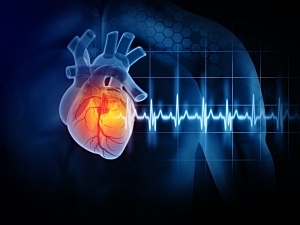Physician-scientists and surgeons at Brigham and Women’s Hospital are giving advanced heart failure patients a new option that parallels the life prolongation of heart transplantation: implantation of a fully magnetically levitated left ventricular assist device (LVAD).
Thanks to innovative surgical techniques and new, validated, patient-specific tools to predict survival, the device gives renewed hope to a broader range of patients who would otherwise be denied this innovative therapy.
Mandeep R. Mehra, MD, is executive director of the Center for Advanced Heart Disease at the Brigham. He has been on the forefront of LVAD research for over a decade, designing and leading clinical trials for LVAD therapy, including the pivotal MOMENTUM 3 Trial published in The New England Journal of Medicine. His recent work has focused on designing an improved LVAD to better promote the concept of long-term patient recovery instead of short-term cardiac support.
“The newest, third-generation device, called HeartMate3™, is so small and durable that we can implant it through less invasive surgical techniques in earlier stages of the disease,” Dr. Mehra says. “Instead of prolonging life of patients with advanced heart failure by only a few months, as we saw with earlier-generation LVADs, this pump is associated survival that exceeds five years.”
Dr. Mehra adds that this new generation of LVADs also diminishes hemocompatibility-related adverse events such as de novo pump thrombosis, ischemic and hemorrhagic strokes, and nonsurgical bleeding. He is leading the multicenter, randomized ARIES trial, which investigates the use of a vitamin K antagonist with aspirin versus vitamin K antagonist alone with placebo to further reduce the risk of such adverse events. He expects to report data from the trial next year.
Individualized Risk Assessment Guides Treatment
The decision to implant an LVAD is complex and requires shared decision-making among the clinical team, patient, and care partners. However, risk models associated with earlier-generation LVADs are not ideally suited to guide present-day decisions due to dynamic changes in therapeutic choices and improved outcomes with newer LVADs.
To address this shortcoming, Dr. Mehra and colleagues developed and validated a useful, patient-specific HeartMate 3 Survival Risk Score (published in JACC: Heart Failure). The risk model six commonly-available preimplantation parameters to predict individual one- and two-year survival rates after LVAD implantation, including
- Demographic variables (age and prior coronary or valvular surgery)
- Laboratory data (serum sodium and blood urea nitrogen)
- Echocardiogram parameters (left ventricular end-diastolic dimension)
- Hemodynamic findings (right atrial pressure-to-pulmonary capillary wedge pressure)
“Using this risk score in combination with psychosocial, nutritional, and frailty evaluations by psychologists, nutritionists, and social workers helps clinicians prioritize patients for LVAD therapy and gives patients a higher degree of confidence in their expected outcome following LVAD implantation,” Dr. Mehra says. The prediction calculator is available here.
Surgical Innovation Extends LVAD Option to ‘Problem’ Candidates
While LVAD implantation holds promise for many advanced heart failure patients, other patients remain “problematic,” according to Akinobu Itoh, MD, PhD, surgical director of the Brigham’s Heart Transplant and Mechanical Circulatory Support Program. Dr. Itoh has implanted hundreds of LVADs. He notes that until recently, they have been unsuitable for patients with small left ventricular cavities and those with restrictive or hypertrophic cardiomyopathy due to obstructed blood inflow to the device.
“The diameter of the LVAD inflow canula is only two centimeters, but for pediatric patients and smaller adults with small or narrow left ventricular cavities, it is challenging and cumbersome,” he says. “As a result, these patients are at increased risk of suction events and suboptimal LVAD flow with frequent alarms.”
To solve this problem, Dr. Itoh has started using a left atrial conduit technique in which the LVAD is connected to an e-PTFE (polytetrafluoroethylene) conduit tunneled through the right atrium and sewn to the fossa ovalis (in contrast with the traditional route of implanting it to the apex of the ventricle). The technique simplifies the implantation with good exposure through the right atrium while limiting additional interventions.
Dr. Itoh’s significant experience with LVAD implementation has led him to be a go-to resource for best practices around device placement and provisioning, optimal ventricle cutting and outflow graft placement, left atrial appendage ligation, and pre- and post-operative device management.
“Surgeons at the Brigham are using new surgical techniques to overcome challenges for patients who may be denied LVAD treatment at other centers,” Dr. Mehra says.
An Invitation to Refer Advanced Heart Failure Patients
Dr. Mehra continues investigating disruptive, newer-generation LVAD devices, including those with smart pumping technology. Meanwhile, Dr. Itoh’s work has been recognized nationally and internationally, including at the Heart Failure Society of America’s Annual Scientific Meeting in October, where his demonstration of new surgical techniques for LVAD implantation was featured in a late-breaking session.
The future of heart failure treatment at the Brigham is extremely bright. The institution’s leadership in LVAD therapy, coupled with its long-term reputation as a center for human and artificial heart transplant innovation, makes the Brigham ideally suited for patient referrals.
“We focus on the three R’s of heart failure—repair, replacement, and recovery,” Dr. Mehra says. “We encourage cardiologists and other practitioners to learn how to identify the key signs of transition, from stable heart failure that can be treated with conventional therapies to advanced heart failure that needs advanced therapies like new-generation LVADs, so that they can refer patients for timely treatment here at the Brigham.”
To refer a patient to an advanced heart failure specialist in the Center for Advanced Heart Disease, please call (857) 307-4000.
